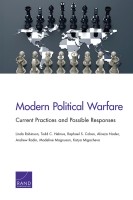 Both Russia and China are governed by opaque, highly centralized and increasingly personalized governments. Political warfare, for such regimes, is second nature, according to Hal Brands, the Henry A. Kissinger Distinguished Professor of Global Affairs at Johns Hopkins University, and Toshi Yoshihara, a senior fellow at the Center for Strategic and Budgetary Assessments.
Both Russia and China are governed by opaque, highly centralized and increasingly personalized governments. Political warfare, for such regimes, is second nature, according to Hal Brands, the Henry A. Kissinger Distinguished Professor of Global Affairs at Johns Hopkins University, and Toshi Yoshihara, a senior fellow at the Center for Strategic and Budgetary Assessments.
Restoring America’s competitive edge today, in a new era of competition with authoritarian rivals, will once again require putting the clash of ideas and values center-stage, they write for The National Interest, citing the creation of the National Endowment for Democracy (NED) as part of a push to spread liberal political values and undercut the appeal of communism during the Cold War.
America’s Cold War experience demonstrates the merit of vigorous, sustained political warfare in discomfiting and disadvantaging an authoritarian adversary. Washington might profitably reclaim that tradition in dealing with its rivals today, they add, proposing four lines of effort:
-
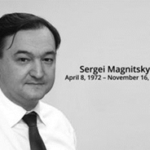
Credit ESI
First, Washington should raise the price of authoritarian governance in China and Russia. By levying targeted sanctions against high-ranking officials and businesses associated with domestic repression….the Magnitsky and Global Magnitsky Acts passed by Congress in 2012 and 2016 provide a template for imposing these costs….
- A second line of effort involves strengthening dissident or liberalizing currents within Chinese and Russian society. ….By showing moral support to embattled religious groups, ethnic minorities and human rights activists, Washington helps keep hopes of long-term liberalization alive while also exerting ideological pressure on Moscow and Beijing….
- A third line of effort entails mounting a vigorous counteroffensive against Russian and Chinese efforts to make the world—and particularly their “near abroads”—unsafe for democracy. ….The democratic states around the Russian and Chinese peripheries deserve special emphasis here because support for these states is offensive political warfare against Moscow and Beijing. ….
- Fourth, the United States must enable all these activities by rebuilding its governmental capacity to wage political warfare. The campaigns described here will require well-developed tools of influence and coordinating diverse initiatives that reach across multiple departments and agencies. This will mean increasing funding for entities such as VOA, the NED and the U.S. Agency for International Development; it will mean revitalizing the tools of public diplomacy that the U.S. government wielded during the Cold War. . ….
 NED Vice President for Studies and Analysis Christopher Walker testified recently on the threat of sharp power to the integrity of democracies in the context of cultural diplomacy before the Canadian Standing Senate Committee on Foreign Affairs and International Trade.
NED Vice President for Studies and Analysis Christopher Walker testified recently on the threat of sharp power to the integrity of democracies in the context of cultural diplomacy before the Canadian Standing Senate Committee on Foreign Affairs and International Trade.
For several reasons, however, a purely defensive posture is neither sufficient nor desirable, Brands and Yoshihara contend:
- First, political warfare is an arena in which the defense faces inherent disadvantages. It is generally less difficult and costly to conduct cyberattacks than to properly attribute and defend against them; it can also be cheaper and easier for a sophisticated adversary to spread disinformation than it is to detect and correct it. …
- Second, a static defense is particularly problematic for a liberal democracy. Because the American system is so open, it offers countless entry points and avenues of influence for nefarious actors. And because government power is limited, divided and decentralized, it is particularly difficult to cover the resulting vulnerabilities. ….
- A third reason for going on the offensive is that America’s competitors are themselves incredibly vulnerable to political warfare. …. Both the Russian and Chinese regimes are flagrantly corrupt, deeply repressive and characterized by extreme concentrations of wealth and power. Their legitimacy is perpetually precarious because it stems from economic performance or the deliberate stoking of nationalism, rather than the inherent attractiveness of the political model. ….
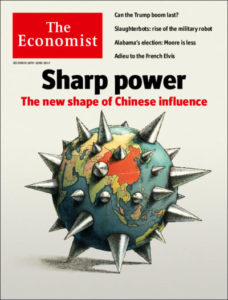 Finally, a comprehensive approach to political warfare is integral to a comprehensive strategy for competition. The United States need not match China and Russia on every geographical front or in every functional area. But it should address a glaring disparity: the fact that America’s rivals have taken a far more holistic and expansive approach to competition…
Finally, a comprehensive approach to political warfare is integral to a comprehensive strategy for competition. The United States need not match China and Russia on every geographical front or in every functional area. But it should address a glaring disparity: the fact that America’s rivals have taken a far more holistic and expansive approach to competition…
Covert, coercive, or corrupting
No small share of [China’s] activities takes a more disturbing form, exploiting the openness of democratic societies to ….“challenge, and sometimes even undermine, core American freedoms, norms, and laws,” notes Stanford University’s Larry Diamond.
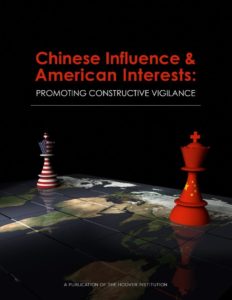 These are not legitimate expressions of soft power. They constitute “sharp power” in that they seek to burrow into and compromise the integrity of key institutions in a democratic society, such as universities and the mass media, he writes for The American Interest. They do not meet democratic institutions on an open level and reciprocal playing field. Rather they are, as Australian Prime Minister Malcolm Turnbull characterized them in his speech one year ago introducing new national security legislation to meet the challenge, “covert, coercive, or corrupting.”
These are not legitimate expressions of soft power. They constitute “sharp power” in that they seek to burrow into and compromise the integrity of key institutions in a democratic society, such as universities and the mass media, he writes for The American Interest. They do not meet democratic institutions on an open level and reciprocal playing field. Rather they are, as Australian Prime Minister Malcolm Turnbull characterized them in his speech one year ago introducing new national security legislation to meet the challenge, “covert, coercive, or corrupting.”
The potential for a strategically productive counteroffensive is there. But making the most of the opportunity will require some key intellectual adjustments, Brands and Yoshihara suggest:
- First, policymakers must become more comfortable with competition as a way of life. Waging political warfare does not mean shutting down diplomacy with Russia and China, but it does require embracing intensified competition on a sustained basis and considering approaches that have hitherto been off-limits. …
- Second, and related, policymakers must accept higher levels of risk than they have become accustomed to since the end of the Cold War. …
- Third, even as policymakers court greater risk, they must manage expectations. …. Democratic political warfare will neither end authoritarian political warfare nor change the nature of the Russian and Chinese regimes, at least any time in the foreseeable future. It might, however, knock back America’s rivals, make the terms of the competitions more favorable to Washington and preserve the possibility of longer-term political evolution….
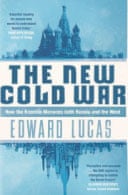 Finally, girding for that contest will require embracing the role of ideology and the clash of values. For too long after the Cold War, there was an assumption in U.S. policy circles that ideology no longer mattered … But by losing sight of the importance of ideology, Washington also lost sight of a fundamental driver of conflict with authoritarian states—the inherent clash between liberalism and illiberalism. …
Finally, girding for that contest will require embracing the role of ideology and the clash of values. For too long after the Cold War, there was an assumption in U.S. policy circles that ideology no longer mattered … But by losing sight of the importance of ideology, Washington also lost sight of a fundamental driver of conflict with authoritarian states—the inherent clash between liberalism and illiberalism. …
Building upon the Center for International Private Enterprise‘s assessment of “corrosive capital” in the Balkans and other regions, Eric Hontz examines the role of Chinese and Russian investment in perpetuating poor governance in Central Asia.
“During the Cold War, the administrations that most effectively waged political warfare never forgot the importance of highlighting the ideological differences between the United States and its adversaries,” Brands and Yoshihara conclude. “Restoring America’s competitive edge today, in a new era of competition with authoritarian rivals, will once again require putting the clash of ideas and values center-stage.” RTWT
Brands’s newest book, with Charles Edel, is The Lessons of Tragedy: Statecraft and World Order. Yoshihara’s latest book, with James R. Holmes, is the second edition of Red Star Over the Pacific: China’s Rise and the Challenge to U.S. Maritime Strategy.







